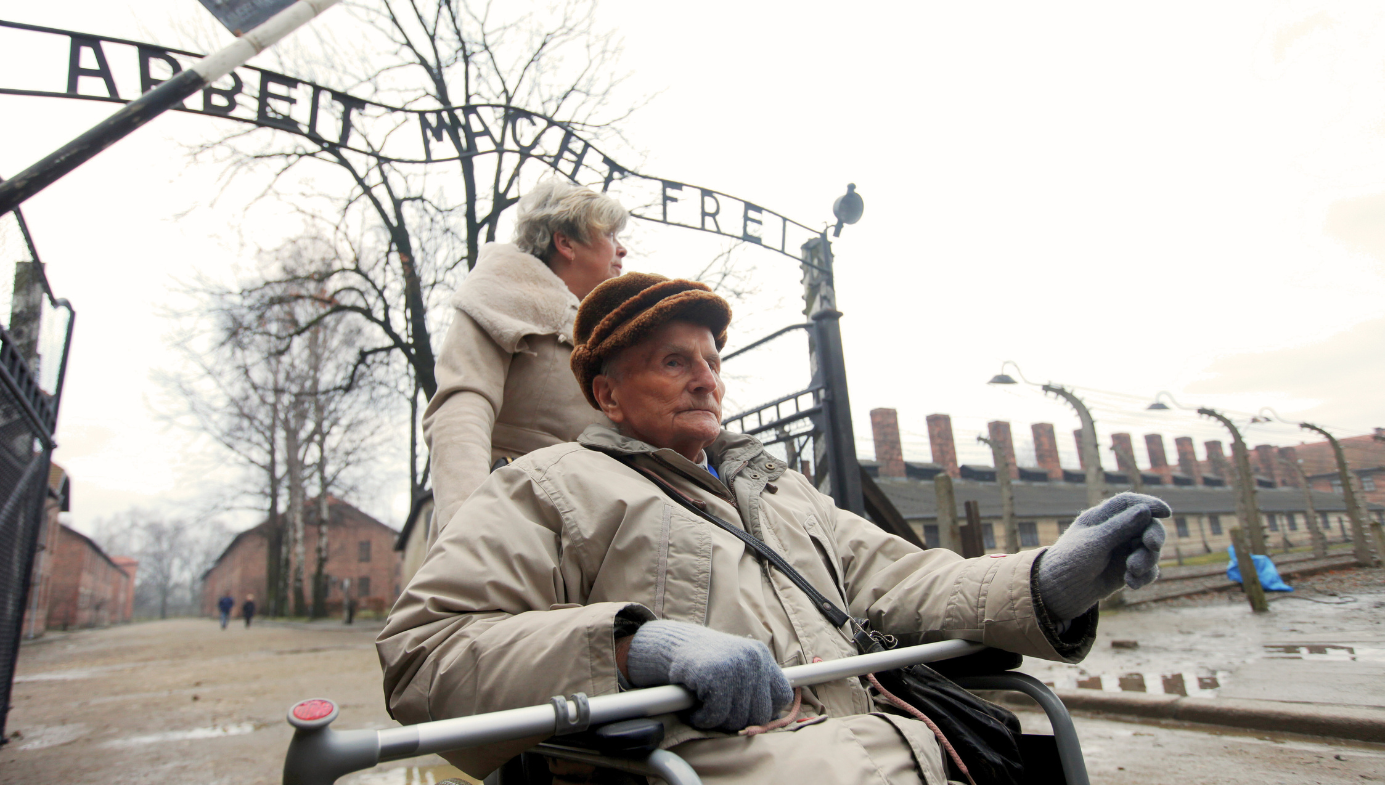History
Bravery and Betrayal: The Peculiar Case of Ágnes Heller
Heller’s overarching message, the consistently identifiable thread woven through her oeuvre, seems to have been this: find a cause and seize it.

Balatonalmádi is a small lakeside village in Hungary still brimming with socialist influence: Stalinist architecture, standardized everything, alongside the serenity of the lake after which it is named. It was here that on July 19th, 2019, a 90-year-old woman went for a swim and did not come back. Her name was Ágnes Heller, and she was one of the most distinguished female philosophers of the modern world. Heller was full of life, with a vivacious laugh and venomous sense of humor, but she also enjoyed a reputation as a principled foe of injustice and defender of the oppressed, whether they were Jews, women, or whoever happened to be on the wrong side of power. In particular, she was revered as a courageous political dissident and outspoken supporter of the doomed uprising against Hungary’s communist regime in 1956, a vitally important event in the history of her homeland. At a 2007 conference in Berlin, when asked about the book she and her husband had written about the events of 1956, she said:
For me, 1956 was holy like nothing else. It was the biggest political experience of my life. We were the only ones—nobody else during that time, in Hungary and outside, spoke about it.
Heller’s reputation for integrity, however, sits uneasily with an obsequious letter she wrote to the Communist Party just three years after the revolution, in which she begged forgiveness for her errors and missteps and denounced friends and former comrades for theirs. The Hungarian paper Magyar Nemzet published the letter in 2011 after Ágnes Hankiss, a Fidesz representative, chanced upon it in the Hungarian National Archives. Heller offered two explanations for the letter, neither of which is especially plausible. First, she claimed that her then-husband, philosopher István Hermann, had written the letter, save for the concluding two paragraphs which she acknowledged were her own (although scans of the document revealed no signs of tampering). Later, she claimed that he had composed the letter entirely and merely had her type it and send it in her name. Her initial explanation is particularly weak given that the letter’s closing lines are among its most damning:
I beseech the comrades to aid me in correcting my mistakes. I know that I cannot be a Marxist philosopher without participating in the current ideological battles of the Party. I would like you to tell me what I can do to prove myself and make my intentions clear, other than my daily work within the movement. I would, for instance, be glad to write a critique of my own paper on ethics, should a need for this arise.
Comrade’s Greetings:
Heller Ágnes [My translation]
To understand why this letter was such a blow to Heller’s reputation, it helps to recall the political climate in Hungary at the time. On October 23rd, 1956, a student protest took place in the streets of Budapest. Over the next few days, the protest grew into a nationwide uprising that resulted in the collapse of Hungarian government. Though the revolution was eventually crushed by Russian military force, a subtle, promising wind of change began to blow from the West. Ultimately, it was the Soviet execution of Prime Minister Imre Nagy in 1958 that precipitated the long-awaited turning point.
As a result, “Goulash Communism” began to emerge, and Hungary soon came to be known as the “happiest barracks” in the Eastern Bloc. Dissenting opinion was permitted and even, occasionally, encouraged: Comedy shows that parodied the communist regime became a popular pastime, as did attending church. These were the years after Khrushchev’s Secret Speech at the 20th Congress, and Stalinism was slowly thawing. In such an environment, the pressures that might have previously compelled someone like Heller, who held a secure and comfortable teaching position in Hungary, to write such a letter had been considerably relaxed.
Nevertheless, upon the letter’s discovery, Heller could have claimed that, at the time, she felt afraid for her family and for the safety of her first child, Zsuzsanna, who had been born in 1952. Alternatively, she might have said that the letter expressed how she earnestly felt in the wake of the Hungarian uprising’s failure. Or she could have disavowed the letter altogether, and insisted that it was a forgery. Instead, she chose the most unlikely and least exculpatory scenario, and passed responsibility for its contents on to her late husband who was no longer alive to defend himself or to corroborate her account.
Throughout her career, Heller maintained that the revolution of 1956 was the most important political event of her life. In her native Hungary, she came to be widely regarded as one of that event’s central figures, an international icon of the revolution, even though she took no active part in it (it must be said that she took no active part in opposing it, either). And Heller had good reason to be as hostile to totalitarianism as she later made herself appear to be: She was born in Budapest on May 12th, 1929, in the small pocket of relief between two world wars, the latter of which—and especially its disastrous effects on the Jewish population of Europe—was to inform her thinking for the rest of her life.

Heller’s father Pal was a lawyer of middling success who, in the years before the war, helped Jews gather the paperwork necessary to leave an increasingly threatening environment. He was deported to Auschwitz where he was murdered just before the war ended. After his death, Ágnes and her mother were left destitute. Heller’s mother, an accomplished milliner, lost her store and had to take various menial jobs before becoming a typist to make ends meet. The Hellers reportedly moved back into their apartment on Falk Miksa Street in Budapest’s government district, an area which was as upscale then as it is now. This seems like an unlikely stroke of luck in the postwar period of Stalinist rule: During those years, over 60,000 court cases were filed by people who owned property before the war and new residents seeking to acquire real estate, and those cases were presided over by the Communist Party—a cause to which Heller dedicated herself with relative swiftness.
In 1947, the young Heller began to study chemistry and physics at the University of Budapest, but soon shifted her focus to philosophy after she attended a lecture delivered by Marxist philosopher György Lukács. She was taken by how he addressed the questions she had regarding life in the broken modern world, especially following the Holocaust, and she joined the Communist Party that same year. However, her developing interest in Marxism soon collided with a conviction that the Party was throttling independent thought, and she was expelled for the first time in 1949, during Mátyás Rákosi’s tenure as the Party’s Stalinist general secretary.
A few years later, Heller was permitted to rejoin the Party and resume her studies under the supervision of Lukács. The circumstances of her re-admittance are unknown, but her ideas at the time seemed to position Heller as ideologically hostile even to the increasingly lenient regime of János Kádár. In 1958, she was again expelled from the Communist Party and stripped of her teaching responsibilities after she refused to name Lukács as a collaborator in the 1956 uprising. However, in her letter to the Party the following year, Heller claimed that Lukács was at least partly responsible for her own political deviance:
Until now, I have only spoken about my own person, but have not mentioned my relationship with György Lukács. It was in no small part due to Lukács’s influence—his body of work and his person—that guided me to communism, Marxism, and the Party. But he committed a number of political mistakes in the past two years. My adherence to his person and perceived respect for his work prevented me for a long time from noticing these mistakes. This was the basis for many of my mistakes. When, for instance, the university attempted to hold the Lukács debate, I tried to prevent it from happening within the university’s walls because I felt at the time that it would be wrong. [My translation]
After he died in 1971, Heller claimed that Lukács, and other members of the dissident Budapest School he had helped to establish, had been victims of political persecution—that they were dismissed from their university jobs, and subject to government surveillance and harassment. This was true, of course, but Heller never mentioned her own small part in this persecution, nor the devotion to and support for the cause of the Communist Party she expressed in the closing paragraph of a letter denouncing her friends and collaborators. Even after the letter was unearthed, she was unable to acknowledge the significance of that betrayal.
To the contrary, Heller claimed that it was this kind of political persecution that eventually led her and her second husband, the philosopher Ferenc Fehér, to leave Hungary for Australia in 1977. But in order to do this, they would have needed a blue passport (instead of the standard red one, valid only for Bulgaria, Czechoslovakia, Yugoslavia, Romania, Poland, the GDR, and the Soviet Union), which provided holders with a license to move freely between Hungary and the West. This was no small achievement, even in the late-Seventies. By Heller’s own account, citizens could only obtain such a document if they had already secured employment, which is apparently why a representative of La Trobe University in Melbourne, Australia travelled to Hungary to interview her and grant her a position. Nevertheless, the Iron Curtain meant that obtaining a job in the West was exceedingly difficult unless an individual was on good terms with the Party, which Heller later insisted she was not. Heller and Fehér then left Australia for New York in 1986 to take up teaching positions, and it was there that she established herself as one of the world’s preeminent and most influential philosophers.
In the years of Viktor Orbán’s astonishing rise to power, Heller became a forthright opponent of his administration. The negligence she perceived on the part of the Hungarian people in tolerating and facilitating his rule was understood to be foreign to the liberalism and freedom of conscience she represented. She enjoined others to fight for what they believed in and to lead by example in resisting oppression. But how are the sentiments expressed in her 1959 letter congruent with the anti-totalitarianism for which she became famous and so widely admired? In the 2009 essay collection Engaging Ágnes Heller, editor Katie Terezakis offers a representative example of the myth that grew around Heller:
Perhaps it is true that all philosophy is in some sense autobiography, or more specifically, that Heller has very much lived her philosophy, including when she has had to pay for it with political persecution, social ostracism and the resultant need to emigrate from her native Hungary. But it is also true that Heller’s way of being in the world and of being with others is utterly in harmony with her approach to philosophy, and this is remarkable.
Compare those words with this section from Heller’s letter, uncovered two years later:
It was a political mistake that I was more or less blind to the revolutionaries that some of my friends had become. I only stopped my none-too-frequent letter correspondence with István Mészáros, for instance, when it came to my attention that he took a position within the dissident writer’s union, and it thus became clear that he was a traitor. [My translation]
Heller has said that she became interested in Marxism and joined the Communist Party because she, along with many other intellectuals in her situation, felt that communism provided answers to pressing questions regarding exploitation, oppression, and morality. She was by no means the only intellectual to make that mistake. However, her remorseful letter renouncing her support for a revolution that was intended to bring about the freedom from oppression she seemed to desire is harder to forgive.

Heller’s overarching message, the consistently identifiable thread woven through her oeuvre, seems to have been this: find a cause and seize it. Make it your own and then fight for it with everything you’ve got: sacrifice and suffering will be the measures of your dedication. So how was it possible for a person of her moral fortitude to write such a letter to the Communist Party? How could she sell out her friends and colleagues in order to maintain her status within Hungarian society, in violation of her most ardently expressed convictions? And why, in hindsight, was she not able to take responsibility for her betrayal?
Heller’s motivations remain unclear, and no honest justification for the letter can be ascertained, because she never provided one. But the most parsimonious explanation seems to be the most likely—Heller quietly sacrificed her integrity for professional expediency. She calculated that life inside the Party would be easier than life outside it and made the necessary compromises. In the Hungarian publication HVG, historian László Eörsi argued that letters like hers were mostly written out of some compulsion rather than with advancement in mind, and should therefore be forgivable. This case might legitimately be made on behalf of anyone but Heller who made a fearless commitment to truth and integrity central to her ethics.
Time was when Heller held that truth was the only thing that mattered. But over the years, the real objective for her became not truth but conversation: talking about everything, even uncomfortable, unsettling, and inconvenient things. By this token, and with the implicit approval of Ágnes Heller herself, we should be speaking frankly about this unseemly stain on her legacy. And yet, one of the most peculiar aspects of this episode is that her letter has been largely ignored outside of Hungary. It is not mentioned on her English Wikipedia page and was omitted from most of the obituaries I read in the Western press.
And so, Heller’s reputational legacy remains that of a free spirit who liberated herself from the chains of injustice and dogmatism to fight for what is right. After the letter’s discovery in 2011, when the resulting polemic died down, Heller was routinely called back to pose in her old role of ’56 poster child, and over time, the mask melded once again with its wearer: Heller, the political product. The legend became more important than the reality—an anti-totalitarian message too important to be compromised by a flawed messenger.






